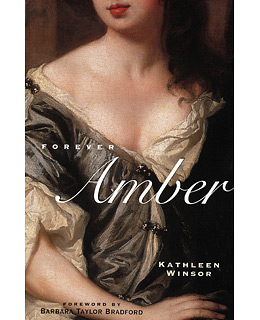
Forever Amber, written by kathleen Winsor in 1944, was banned in Boston at the time of its publication as "obscene and offensive." This alone would have been enough to excite my interest, but in 1956, it was sitting inoffensively on the shelves of the small country library on the north shore of Oahu, Hawaii, where my family spent its summers.
The book, set in 17th century London, tells the story of Amber St. Clare. Deserted at 16, she is imprisoned in Newgate, where she falls under the protection of the dashing pirate Black Jack Mallard. He arranges her release and establishes her as a working girl in Whitefriars. She finds a noble protector, marries an old man, survives the plague and becomes the mistress of Charles II. At the end of the book, she sails for America in search of her true love, cavalier Lord Bruce Carlton. As Miss Winsor would never be so vulgar as to call Amber a prostitute, I took the words working girl to mean just that—I imagined that she worked as a housemaid or perhaps a pastry cook. Whatever she did, Amber was my first conscious erotic experience.
Revisionist critics have compared the book to the work of Camus, Defoe and Thackeray. When it was published, the attorney general of Massachusetts claimed in court that seven abortions and 39 illegitimate pregnancies (in addition to 10 women who whisked off their clothes in the presence of men) were featured in the book. I did not become pregnant after reading it, nor did I parade naked before men, but I was mesmerized. In truth, I fell in love.
Moore's most recent book is The Big Girls.